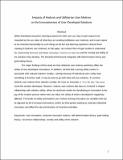Impacts of Hedonic and Utilitarian User Motives on the Innovativeness of User-Developed Solutions
Author(s)
Stock-Homburg, Ruth Maria; Oliveira, Pedro Manuel Sousa Mendes; von Hippel, Eric A.
Downloadvon-Hippel_Impacts of hedonic.pdf (657.4Kb)
OPEN_ACCESS_POLICY
Open Access Policy
Creative Commons Attribution-Noncommercial-Share Alike
Terms of use
Metadata
Show full item recordAbstract
When individual consumers develop products for their own use, they in part expect to be rewarded by the use value of what they are creating (utilitarian user motives), and in part expect to be rewarded intrinsically by such things as the fun and learning experience derived from creating it (hedonic user motives). This paper shows a first-of-type study to understand the relationship between individual consumers' motives to innovate and the novelty and utility of the solutions they develop. The theoretical framework integrates self-determination theory and goal-setting theory.
The major findings of this study are that utilitarian user motives positively affect the utility of user-developed innovations. In contrast, hedonic user motives drive solution novelty; the more an innovator is “in it for fun,” the more novel the solution developed. However, hedonic user motives also have an inverted U-shaped relationship with solution utility. When the dominant motive for developing an innovation is the joy of the creative process rather than use value, the utility of what is developed is negatively affected. These findings are of research interest, and can be of significant practical interest to producers hoping to benefit from user-developed innovations. For the first time, it has been possible to show that the adjustment of hedonic rewards, for example by means such as gamification, can affect the nature and utility of solutions individuals create.
Date issued
2017-09-05Department
Sloan School of ManagementJournal
Journal of Product Innovation Management
Publisher
Wiley Blackwell
Citation
Stock, Ruth Maria, et al. “Impacts of Hedonic and Utilitarian User Motives on the Innovativeness of User-Developed Solutions.” Journal of Product Innovation Management 32, 3 (July 2014): 389–403 © 2014 Product Development & Management Association
Version: Original manuscript
ISSN
0737-6782
1540-5885